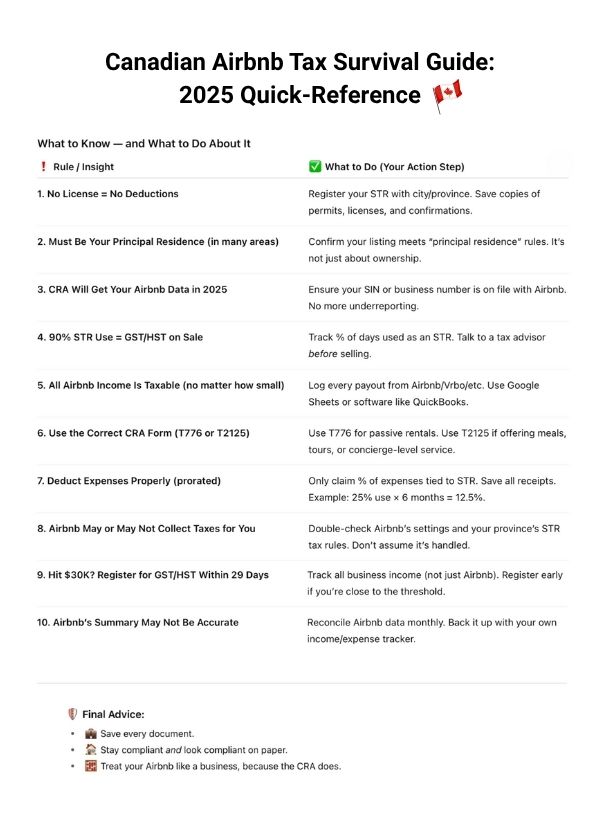10 Airbnb Tax Tips Every Canadian Host Should Know
Taxes in Canada just got personal for Airbnb hosts. From licensing rules to surprise GST, this guide breaks it down before the CRA breaks you.
Airbnb Taxes in Canada: 10 Rules You Can’t Afford to Ignore in 2025
(And the One That Will Wreck You If You Miss It)
Hosting in Canada has never been more regulated—and 2025 is the year the tax man, your city, and your province are all watching.
Get this wrong, and you won’t just pay more tax—you could lose every deduction you thought you had coming.
Here’s the list every Canadian host needs before tax season.
1. No License = No Deductions
As of 2024, if your short-term rental isn’t fully compliant with municipal and provincial rules, the CRA can deny all your expense claims—mortgage interest, utilities, maintenance, insurance, the lot.
Doesn’t matter if you report your income. If you’re out of compliance, your deductions vanish.
Action Step: Get your STR registered and licensed with your city/province. Save digital and hard copies of your paperwork—permits, renewals, confirmation emails—in case of audit.
2. Your Airbnb Might Need to Be Your Actual Home
Cities like Toronto and Vancouver, and now British Columbia (2025), require your STR to be your principal residence—meaning you live there most of the year. Owning it isn’t enough.
Action Step: Double-check your municipality’s definition of “principal residence” and ensure your listing meets it. Non-compliance here = lost deductions and hefty fines.
3. The CRA Will Get Your Numbers Directly
Starting January 2025, Airbnb, Vrbo, and similar platforms must send:
- Your gross earnings
- Your name and SIN/business number
- Your property address
…straight to the CRA by January 31 for the prior year.
Action Step: Make sure your tax details are correct in your host profile. The under-the-radar days are over.
4. Pass the “90% Rule” or Pay GST/HST on Sale
If your property is used for short-term rentals more than 90% of the time, it may be treated as a commercial property on sale—triggering GST/HST (13% in Ontario) on the transaction.
Action Step: Before listing your property for sale, calculate your STR usage percentage and talk to a tax pro. The 90% cutoff can be nuanced.
5. All Airbnb Income Is Taxable
Whether it’s $500 from a weekend rental or $50K from a full-time business, there’s no exemption threshold in Canada.
Action Step: Track every payout from Airbnb and any other platform—apps like QuickBooks or even Google Sheets work fine.
6. Use the Right CRA Form
- T776 for rental income (hands-off hosting)
- T2125 if you’re providing extra services (meals, tours, concierge-level hosting = self-employed income)
Action Step: Choose the correct form now so you’re not scrambling at tax time.
7. Deduct Expenses the Right Way
Claimable expenses include mortgage interest, utilities, cleaning, insurance, condo fees, supplies, repairs—but only for the portion of the home and time used for STR.
Action Step: If you rent 25% of your space for half the year, that’s a 12.5% deduction rate. Keep all receipts and prorate correctly.
8. Airbnb Might Collect Taxes—Or Not
In most provinces, Airbnb handles GST/HST, but if you’re registered for GST/HST, you do the collecting and remitting yourself. Rules vary by province and sometimes by city.
Action Step: Check both your provincial tax authority and Airbnb’s help pages to confirm what applies to your listing.
9. Cross $30K? Register for GST/HST Fast
If your total taxable revenues (Airbnb + other income) exceed $30,000 in any 12-month period, you have 29 days to register.
Action Step: Track your total income across all ventures, not just Airbnb.
10. Audit Your Numbers Before the CRA Does
Airbnb’s transaction summaries aren’t perfect—discounts, refunds, or offline deals can skew totals.
Action Step: Reconcile your own records against Airbnb’s every month, not just at year-end.
🧾 Quick-Reference Recap: Save or Screenshot This

TL;DR for 2025:
- Get licensed and keep proof
- Stay compliant with principal residence rules
- Track your earnings (the CRA will)
- Prorate and document every deduction
- Check GST/HST collection responsibilities
- Audit yourself before they audit you
💡 Want the full deep dive with province-by-province tax rules?
Check out Lodgify’s Host’s Guide to Airbnb Taxes in Canada
Latest posts

Independent hotels and vacation rentals should run a 10-minute AI audit to see how tools like ChatGPT, Google summaries, and OTAs are publicly describing their property without their input. When AI-generated descriptions don’t match reality, expectation gaps erode reviews, ratings, and direct bookings, making proactive source updates a critical part of modern hospitality marketing.

Most independent operators market their property at its best and never see the gap that forms on normal days. The Tuesday Test is a framework for closing the distance between what your listing promises and what midweek guests actually find.

Guests don't return to "fine." They return to specific. This post shows how to find or create one memorable moment that earns direct bookings and referrals instead of handing repeat guest revenue back to OTAs.




